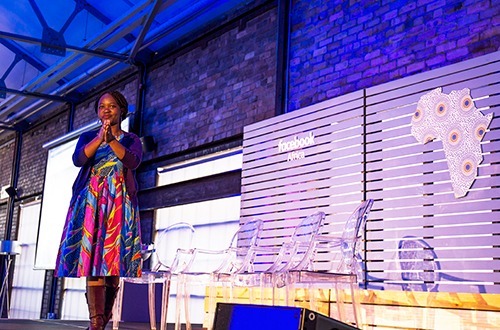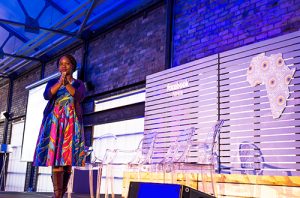More than 250 young entrepreneurs and marketers attended Youth Enterprise Day, a one-day summit hosted by Facebook, the Department of Small Business Development and Livity Africa in celebration of youth entrepreneurship in South Africa.
The event, held on June 24 at the Turbine Hall in Newtown, Johannesburg highlighted the stories of young South Africans who have built successful businesses using online tools offered on platforms like Facebook. Delegates heard from some of South Africa’s most successful youth-run businesses. They then took part in a range of workshops that gave them a crash course on how to use Facebook, Instagram and other digital tools to grow their businesses.
“Digital platforms and technology can give more people opportunities to become entrepreneurs and to build products that engage and empower their communities. As such, this partnership with Livity Africa and the Department of Small Business Development is one way we aim to contribute to job creation and youth employment in South Africa,” says Emilar Gandhi, Public Policy Manager, Southern Africa at Facebook.
Adds Rina Modi, Business Development Director at Livity Africa: “By giving young people the resources and support to build their own businesses, we have a unique opportunity to invest in the future of economic growth in South Africa. It was inspiring to hear young entrepreneurs’ stories about how digital platforms are empowering them to grow their business.”
Panelists in attendance included Rina Chunga, Rich Factory; Abed Tau, Tuta-Me; Nothando Moleketi, ReWare; Nadav Ossendryver, Latest Sightings; Musa Kalenga, Microtising, and Lelo Boyana, Chica and Just Curious.
Africa Code Week 2017 Launches
The 2017 round of Africa Code Week was officially launched last week in Flic-En-Flac, Mauritius. Now in its third year, Africa Code Week aims to spread coding literacy among African youth, with a key focus on female skills development and training.
Started in 2015 by SAP Corporate Social Responsibility EMEA and several public and private sector partners, the initiative has a long-term goal of empowering more than 200,000 teachers and positively impacting the lives of five million children and youth within the next 10 years.
In 2016, more than 426 000 young Africans across 30 countries learnt computer coding basics as part of Africa Code Week, beating initial targets of 150,000 by miles. This year, SAP set a target of impacting the lives of 500,000 youth across 35 African countries from 18-25 October.
“By learning the new language of coding in an open, supportive environment, young Africans are able to take advantage of the immense opportunities presented by the digital revolution and become active players of the global economy,” says Claire Gillissen-Duval, Director of EMEA Corporate Social Responsibility at SAP and Global Project Lead for Africa Code Week.
By 2040, Africa is projected to have a working age population of more than one billion. “Considering the growing global shortage in technical skills, Africa has a unique opportunity to take a lead role in powering the global economy,” says Clas Neumann, senior VP, lead of Fast Growth Market Strategy at SAP.
“However, the lack of widely available education in Science, Technology, Engineering, and Maths (STEM) fields could undermine the continent’s ability to equip this growing workforce with the skills they need to thrive in the digital economy. Africa Code Week is one way of reaching out to even remote corners of the continent and creating interest in the opportunities only the digital world can offer. We hope, that this will help inspiring young Africans to pursue careers that will drive the continent’s digital transformation.” (via Bizcommunity)
SA and Kenya Seek To Boost Trade Opportunities
South African businesses had a crucial role to play in growing the Kenyan economy following on from the commitments made during the State Visit by President Jacob Zuma in October last year.
This was according to acting High Commissioner of South Africa in Kenya, Sarel van Zyl, who was addressing businesspeople from South Africa and Kenya during a business seminar organised by the Department of Trade and Industry (the dti) in partnership with the Kenya National Chamber of Commerce and Industry (KNCCI) in Nairobi, Kenya.
The seminar was part of the Outward Selling Mission to Kenya which was held under the theme “Exploring Trade and Investment Opportunities between Kenya and South Africa”.
The Director of Internal Trade at the Kenyan Department for Trade, Joyce Ongundo emphasised the need for Kenyan and South African companies to devise market-oriented solutions in a bid to address the growing trade imbalance with a view to creating win-win solutions between the two countries.
She further echoed the Kenyan government’s commitment towards intensifying trade and investment relations with South Africa.
The Director of Export Promotion at the dti, Seema Sardha, said that both Kenyan and South African business communities needed to work together towards promoting economic growth of both countries. She identified opportunities that were available to be explored in agri-business, services, automotives, capital equipment, infrastructure development and energy.
“The dti’s new approach to continental development embraces an investment-led strategy anchored on the pillars of market integration, industrial development and infrastructure expansion,” said Sardha.
She explained that Trade and Invest Africa (TIA), an entity within the dti, had been established with the express purpose of advancing the strategy. (via African News Agency)
Launch Of Musina Terminal A Boost To Regional Economic Integration
The launch of the Musina Intermodal Terminal (MIT) was a huge boost to the regional economic integration and Special Economic Zones Programme, Minister of Trade and Industry, Dr Rob Davies, said.
Davies, who was speaking during the launch of the MIT in Musina in Limpopo, said the MIT would contribute immensely to the regional economic integration that South Africa, the SADC region and the continent at large was working hard for.
According to Davies, the Musina Intermodal Terminal addressed a number of policies of government and the promotion of regional economic integration.
The terminal, which is aimed at the containerised cargo market and the transportation of mineral ores such as coal, iron ore, chrome, copper and sulphur, was a stepping stone to bigger projects within and around the newly- designated Musina-Makhado SEZ.
“The SEZ will significantly increase industrial production in the region. This will include steel and related inputs for producing steel and stainless steel, as well as increasing mining development and production. The SEZ will thus increase trade between South Africa and its neighbours. Regional integration will also be deepened,” added Davies. (via African News Agency)







